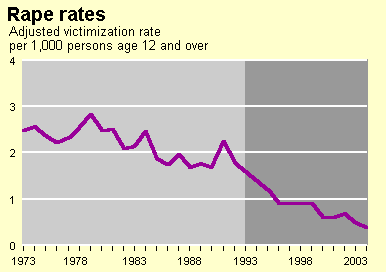as a social scientist, i sometimes get frustrated when i hear academics lament that “nothing ever changes” when they have good data in front of them screaming that lots of things change. i recently heard the argument that racial discrimination at the polls is “as bad or worse” than it had been during passage of the voting rights act of 1965. i’m no expert in this area, but hasn’t there been a significant narrowing of the white / african american turnout gap from 1964 to 2004? things might not change as we want them to and they might not change as quickly as we would prefer, but they do change.
so, here is some good news about a crime of great concern. after seeing a washington post article on the long-term decline in rape in the united states, i thought i’d take a closer look at the data. according to the best available victimization data, rates of rape have dropped from 2.5 per thousand in 1973 to .4 per thousand in 2004. although 40 rapes per 100,000 persons age 12 and over is still way too many, an 84 percent drop in a terrible crime is good news indeed.

although reporting rates have increased over the years, most rapes still go unreported. that’s why the national crime victimization survey data shown above are a better indicator than the fbi’s uniform crime reports, which are based on calls to police. the ucr shows an increase in reports of forcible rape during the 1980s but a steady decline since the early 1990s, from a peak of 43 per 100,000 total population in 1992 to a rate of approximately 32 per 100,000 since 2000.

though the long-term downward trend is more pronounced in the ncvs, by either measure rape has dropped precipitously in the past fifteen years. when i teach differential association and social learning theories of crime, i often ask students whether they encounter “definitions favorable to rape” (many can relate such experiences) or how rapists might employ techniques of neutralization based upon the tacit approval of rape in the larger culture (there are no shortage of examples here, either). as rape has become statistically more rare in the united states, my sense is that it has also become more deviant in a normative sense.
although rape can and should be reduced further, i’d hope that there will be some downward rigidity to this trend. i don’t see an end to rape anywhere in sight, but i’d like to think some more-or-less durable changes in u.s. gender relations over the past few generations will keep rates from rising again. but then i realize that characterizing social change as more-or-less durable ain’t that far from the stability assumptions of those who say “nothing ever changes.” so, i’ll just admit that i don’t know what the future holds, report the good news, and suggest there’s cause for vigilance as well as recognition.

Comments 2
McB — August 17, 2006
Unfortunately, most of the decline in the voter turnout gap is because whites are voting less and less, while blacks turnout has remained relatively steady (which is intriguing). Not exactly progress.
Oh. This post is a month old. Um...
Ashwin kumar — August 14, 2019
I know what is My document and what it does in windows 10 OS computer system thanks to this my documents folder desktop windows 10 where i am able to get full knowledge.